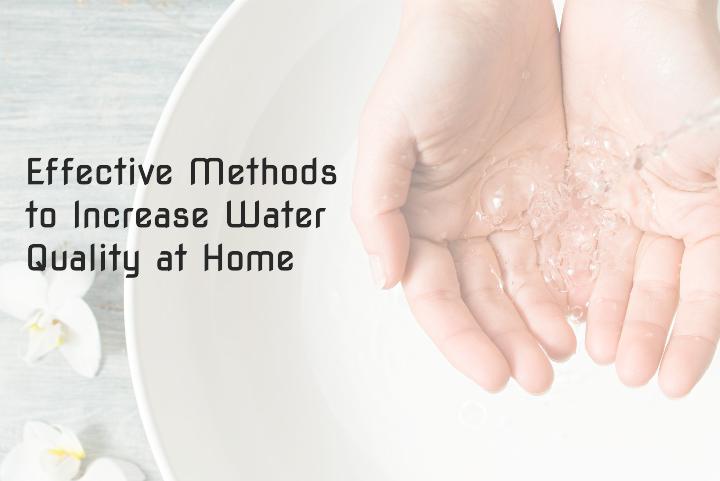Effective Methods to Increase Water Quality at Home
Water is essential for life, and having access to clean, safe drinking water is crucial for our health and well-being. However, with increasing pollution and contamination of water sources, it’s becoming more challenging to ensure the quality of our drinking water.
Fortunately, there are several methods you can use to improve the quality of water in your home. In this article, we’ll explore some effective methods to increase water quality and ensure that you and your family have access to clean, safe drinking water.
Why is Water Quality Important?
Water quality refers to the chemical, physical, and biological characteristics of water. It’s essential to maintain good water quality to protect our health and the environment. Poor water quality can lead to various health issues, including gastrointestinal illness, reproductive problems, and neurological disorders.
Water quality is also crucial for the environment. Contaminated water can harm aquatic life and disrupt the balance of ecosystems. It can also affect the quality of our food and crops, as well as the health of our pets and livestock.
The Dangers of Contaminated Water
Contaminated water can contain harmful substances such as bacteria, viruses, chemicals, and heavy metals. These contaminants can enter our water sources through various means, including industrial and agricultural runoff, sewage, and natural sources.
Drinking contaminated water can lead to various health issues, including:
- Gastrointestinal illness: Contaminated water can cause diarrhea, vomiting, and stomach cramps, which can be especially dangerous for young children, the elderly, and those with weakened immune systems.
- Reproductive problems: Some contaminants in water, such as lead and mercury, can affect reproductive health and cause birth defects.
- Neurological disorders: Heavy metals like lead and mercury can also affect the nervous system and lead to neurological disorders.
- Cancer: Some chemicals found in contaminated water, such as arsenic and benzene, are known to cause cancer.
Methods to Increase Water Quality
There are several methods you can use to improve the quality of water in your home. Let’s take a look at some of the most effective ones.
Water Filtration Systems
Water filtration systems are one of the most popular methods for improving water quality at home. These systems use physical and chemical processes to remove contaminants from water, making it safe for drinking.
There are various types of water filtration systems available, including:
- Reverse osmosis systems: These systems use a semi-permeable membrane to remove contaminants from water.
- Activated carbon filters: These filters use activated carbon to absorb impurities and improve the taste and odor of water.
- UV filters: UV filters use ultraviolet light to kill bacteria and other microorganisms in water.
Water filtration systems are relatively easy to install and maintain, and they can significantly improve the quality of your drinking water.
Boiling Water
Boiling water is a simple and effective way to kill harmful bacteria and other microorganisms in water. It’s especially useful for those who rely on well water or water from natural sources.
To boil water, bring it to a rolling boil for at least one minute. If you’re at a higher altitude, you may need to boil it for longer. After boiling, let the water cool before drinking it.
Water Testing
Regularly testing your water is crucial for ensuring its quality. You can purchase water testing kits from your local hardware store or have your water tested by a professional laboratory.
Water testing can help identify any contaminants in your water and determine the best course of action to improve its quality. It’s especially important for those who rely on well water or water from natural sources, as these sources are more susceptible to contamination.
Water Softeners
Hard water is water that contains high levels of minerals like calcium and magnesium. While hard water is generally safe to drink, it can cause issues with your plumbing and appliances, and it can also affect the taste of your water.
Water softeners are devices that remove minerals from water, making it softer and more pleasant to drink. They work by exchanging the minerals for sodium ions, which are then flushed out of the system.
Chlorination
Chlorination is a process that involves adding chlorine to water to kill harmful bacteria and other microorganisms. It’s a common method used by water treatment plants to ensure the safety of drinking water.
You can also use chlorine tablets or bleach to chlorinate your water at home. However, it’s essential to follow the instructions carefully to avoid over-chlorination, which can be harmful.
Activated Carbon Filters
Activated carbon filters are another type of water filtration system that uses activated carbon to remove impurities from water. These filters are particularly useful for removing organic compounds, such as pesticides and herbicides, from water.
Activated carbon filters are relatively inexpensive and easy to install, making them a popular choice to increase water quality at home.
Other Tips for Improving Water Quality
In addition to the methods mentioned above, there are a few other things you can do to ensure the quality of your drinking water.
Proper Storage
How you store your water can also affect its quality. It’s essential to store water in clean, food-grade containers that are specifically designed for water storage. Avoid using containers that previously held other liquids, as they may contain harmful residues.
It’s also crucial to store water in a cool, dark place to prevent the growth of bacteria and algae.
Regular Maintenance
If you have a water filtration system or other water treatment devices, it’s essential to perform regular maintenance to ensure they’re working correctly. This includes changing filters, cleaning tanks, and checking for any leaks or malfunctions.
Be Mindful of Your Environment
The environment around your water source can also affect its quality. Be mindful of any potential sources of contamination, such as industrial or agricultural activities, and take steps to protect your water source from these pollutants.
Conclusion
Ensuring the quality of our drinking water is crucial for our health and the environment. By using methods like water filtration, boiling, and chlorination, we can improve the quality of water in our homes and protect ourselves from harmful contaminants.
It’s also essential to regularly test our water and take steps to prevent contamination from our environment. By following these tips, we can ensure that we have access to clean, safe drinking water for ourselves and our families.





